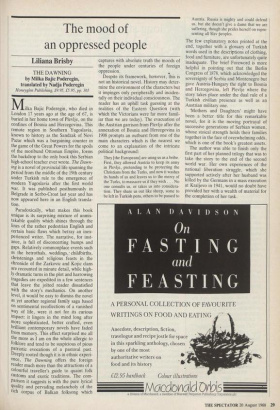The mood of an oppressed people
Liliana Brisby
THE DAWNING by Milka Bajic Poderegin, translated by Nadja Poderegin
Honeyglen Publishing, £9.95, £5.95, pp. 365
Milka Bajic Poderegin, who died in London 17 years ago at the age of 67, is buried in her home town of Plevlje, on the confines of Bosnia and Hercegovina. This remote region in Southern Yugoslavia, known to history as the Sandzak of Novi Pazar which was a bargaining counter in the game of the Great Powers for the spoils of the moribund Ottoman Empire, forms the backdrop to the only book this Serbian high-school teacher ever wrote. The Dawn- ing is a novel of provincial life spanning the period from the middle of the 19th century under Turkish rule to the emergence of modern Yugoslavia after the first world war. It was published posthumously in Belgrade in Serbo-Croat last year and has now appeared here in an English transla- tion.
Paradoxically, what makes this book unique is its surprising mixture of unmis- takable quality which shines through the lines of the rather pedestrian English and certain basic flaws which betray an inex- perienced writer. The narrative, for inst- ance, is full of disconcerting bumps and gaps. Relatively commonplace events such as the betrothals, weddings,. childbirths, christenings and religious feasts in the chronicle of the Zarkovic and Kojic clans are recounted in minute detail, while high- ly dramatic turns in the plot and harrowing tragedies are expedited in a few sentences that leave the jolted reader dissatisfied with the story's mechanics. On another level, it would be easy to dismiss the novel as yet another regional family saga based on sentimental recollections of a vanished Way of life, were it not for its curious impact: it lingers in the mind long after more sophisticated, better crafted, even brilliant contemporary novels have faded from memory. This effect surprised me all the more as I am on the whole allergic to folklore and tend to be suspicious of pious patriotic evocations of a pastoral past. Deeply rooted though it is in ethnic experi- ence, The Dawning offers the foreign reader much more than the attractions of a colourful traveller's guide to quaint folk customs and exotic traditions. The com- parison it suggests is with the pure lyrical quality and pervading melancholy of the rich corpus of Balkan folksong which captures with absolute truth the moods of the people under centuries of foreign oppression.
Despite its framework, however, this is not an historical novel. History may deter- mine the environment of the characters but it impinges only peripherally and inciden- tally on their individual consciousness. The reader has an uphill task guessing at the realities of the Eastern Question (with which the Victorians were far more famil- iar than we are today). The evacuation of the. Austrian garrison from Plevlje after the annexation of Bosnia and Hercegovina in 1908 prompts an outburst from one of the main characters which is the nearest we come to an explanation of the intricate political background:
They [the Europeans] are using us as a bribe. First, they allowed Austria to keep its army in Plevlje, pretending to be protecting the Christians from the Turks, and now it washes its hands of us and leaves us to the mercy of the Turks, to massacre us if they wish . . . No one consults us, or takes us into considera- tion. They share us out like sheep, some to be left in Turkish pens, others to be passed to Austria. Russia is mighty and could defend us, but she doesn't give a damn that we are suffering, though she prides herself on repre- senting all Slav peoples.
The few explanatory notes printed at the end, together with a glossary of Turkish words used in the descriptions of clothing, food and furniture, are unfortunately quite inadequate. The brief Foreword is more helpful in pointing out that the Berlin Congress of 1878, which acknowledged the sovereignty of Serbia and Montenegro but gave Austria-Hungary the right to Bosnia and Hercegovina, left Plevlje where the story takes place under the dual rule of a Turkish civilian presence as well as an Austrian military one.
`Mothers and Daughters' might have been a better title for this remarkable novel, for it is the moving portrayal of successive generations of Serbian women, whose stoical strength holds their families together in the face of overwhelming odds, which is one of the book's greatest assets.
The author was able to finish only the first part of her planned trilogy that was to take the story to the end of the second world war. Her own experiences of the national liberation struggle, which she supported actively after her husband was killed by the Germans in a mass execution at Kraljevo in 1941, would no doubt have provided her with a wealth of material for the completion of her task.






















































 Previous page
Previous page